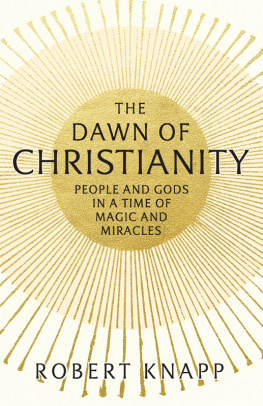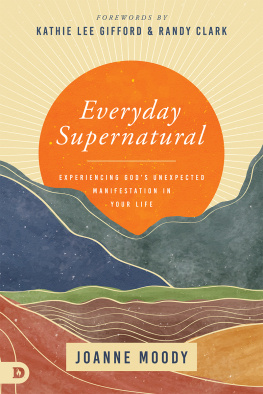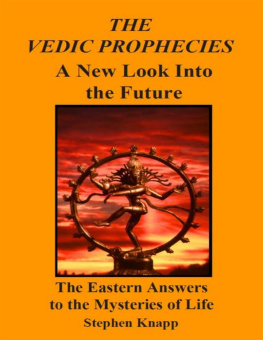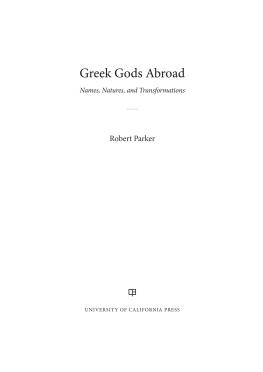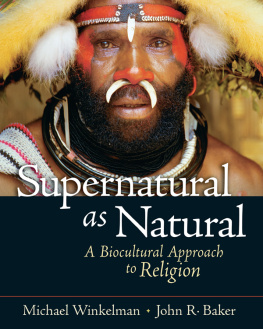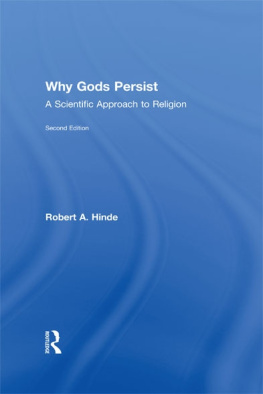THE
DAWN OF
CHRISTIANITY
ROBERT KNAPP taught ancient history for over thirty years at the University of California, Berkeley, where he is now Professor Emeritus. He has published extensively on the world of the Roman Empire, including Invisible Romans (Profile 2011).
By the same author
Roman Crdoba
Invisible Romans
THE
DAWN OF
CHRISTIANITY
PEOPLE AND GODS IN A TIME OF MAGIC AND MIRACLES
ROBERT KNAPP

First published in Great Britain in 2017 by
PROFILE BOOKS LTD
3 Holford Yard
Bevin Way
London WC1X 9HD
www.profilebooks.com
Copyright Robert Knapp, 2017
The moral right of the author has been asserted.
All rights reserved. Without limiting the rights under copyright reserved above, no part of this publication may be reproduced, stored or introduced into a retrieval system, or transmitted, in any form or by any means (electronic, mechanical, photocopying, recording or otherwise), without the prior written permission of both the copyright owner and the publisher of this book.
A CIP catalogue record for this book is available from the British Library.
eISBN 978 1 78283 021 4
MAPS





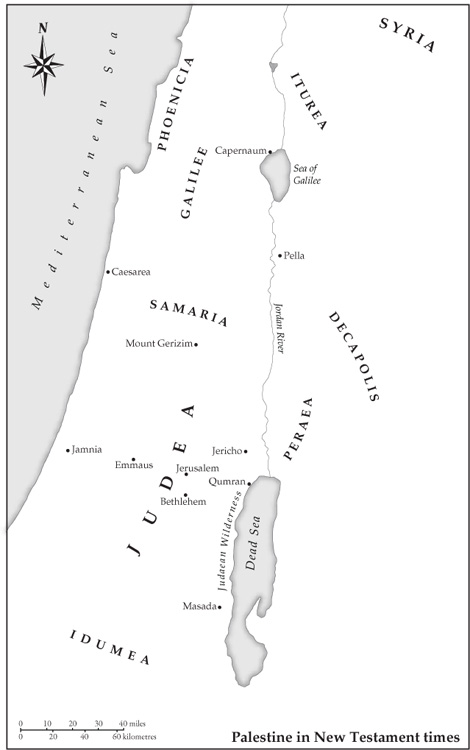
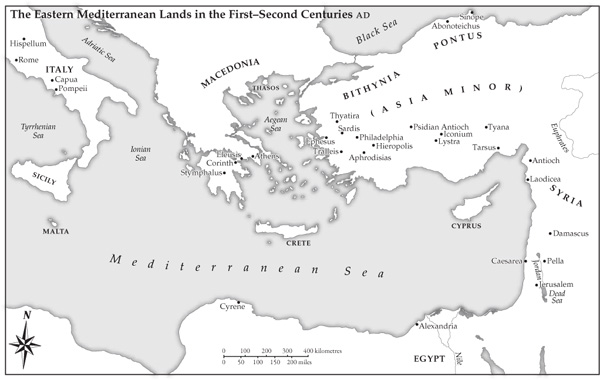
PREFACE
HISTORIANS DEVOTE THEMSELVES TO discovering and revealing the past a past that shimmers, fades in and out, its protean nature always seeking to evade our present. As I take on this huge project of the past, I make no claim to be able to divorce myself from my own ideologies of historical research or social justice, or contemplations on the meaning of life, or any other of a long list of thoughts and emotions colouring how I see the past world while bound by that present. With certainty impossible, the challenge is to approach the past as a series of more or less probable possibilities. Sorting out the probable from the improbable requires a self-awareness of our own limitations, as well as the inherent limitations of the evidence we have to work with.
Acknowledgement is necessary and honest, especially when the topic is as difficult as the religious life of ordinary people. The task set is to trace how the very ordinariness of their lives underlies and explains the emergence of Christianity. Those lives, inextricably entangled with the supernatural as well as the natural world, looked to gods and Fate, sought an orderliness they saw as justice and actively brought to bear magic and miracles in solving their problems. Their simple goals to survive and, if possible, to thrive forced them to be extremely careful and cautious in dealing with those supernatural powers. Yet, many in the end did embrace something new.
Jews and gentiles. Christians and pagans. The more traditional view holds that two traditions of the ancient Greco-Roman world stood at odds; that Christianity emerged as a better answer for humans concerns than either Jews or pagans had. The experience of ordinary people blurs this artificially clear distinction made between those of the Jewish tradition, those who found religious experience with many gods the polytheists and, later, the Christians. The journey to understanding emphasises the commonalities of all three traditions. The experiences of supernatural power that ordinary people shared are the key to understanding the dawn of Christianity.
1
THE JOURNEY
When the day was already beginning to decline, Emperor Constantine saw with his own eyes the trophy of a cross of light in the heavens, above the sun, and bearing the inscription, CONQUER BY THIS. At this sight he himself was struck with amazement, and his whole army also, which followed him on this expedition, and witnessed the miracle.
Eusebius, Life of Constantine
ON 28 OCTOBER IN AD 312 a sign of the cross appeared to Constantine as he prepared for battle at the Milvian Bridge outside Rome with Maxentius, his rival for Roman imperial power. Some sixteen hundred years earlier, according to rabbinic tradition, Moses had stood atop Mount Sinai and received from the Jewish god Yahweh (Jehovah) the Ten Commandments that became the foundation of a covenant between the Israelites and their one god. The polytheist cultures elsewhere in the Mediterranean world conceived of a cosmos that contained many gods, all capable of being helpful or harmful. The Israelites monotheism was different. Many centuries later Yahwehs covenant provided the seed bed for the teachings of a Jewish prophet called Jesus of Nazareth who, by the miracle of the resurrection reported by his disciples, set in motion the events that culminated in Constantines cross nearly three centuries later.
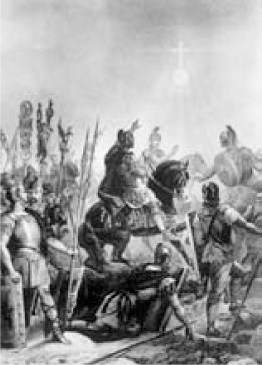
1. Constantine sees a cross in the sky in this nineteenth century imaginative rendering of the event.
The Israelites history goes back a long way from the birth of Jesus. By contrast, the history of polytheists, insofar as it is relevant to the rise of Christianity, goes back for only a few hundred years. If we take 1250 BC as the approximate date for the Israelites exodus from Egypt and covenant with Yahweh shortly thereafter, then we can break their subsequent history into fairly clear periods. For about 250 years they lived in Canaan, now modern Palestine, the land they had invaded and more or less conquered. Their twelve tribes were each led by consensus leaders called judges. The tribes sometimes cooperated in military adventures but they were only loosely united until about 1020, when Saul, their first king, took control of all of them. David succeeded Saul in about 1000 and ruled for approximately forty years, during which he made the city of Jerusalem his capital. Here his son, Solomon, who reigned from about 961 to 922, built the first temple of Yahweh. After Solomons death the kingdom split in two: the northern kingdom, Israel, and the southern kingdom, Judah. There followed a fractious period of intrigue, war and civil war, occasionally interspersed with peace. The great imperial power of the time, the Assyrians, conquered the northern kingdom in 722 and carried ten of the twelve tribes of the Israelites off into exile. They were never to return and are known still as the Lost Tribes of Israel. Those northerners who escaped exile and later mixed with other peoples called themselves Samaritans. In the south the two tribes of Benjamin and Judah continued in the independent Kingdom of Judah. Meanwhile, however, the aggressive empires of Egypt, Assyria and, later, Babylonia competed to control this important pathway between Egypt and the greater Near East. In 587586 Judah succumbed to Babylonia: its elite were sent into exile in Babylon and the nation left devastated: By the waters of Babylon we sat down and wept when we remembered thee, O Sion, the psalmist sang. This inaugurated a period of subservience to one imperial power or another that, with the exception of a few minor intervals, continued for the next two and a half thousand years.
Next page
